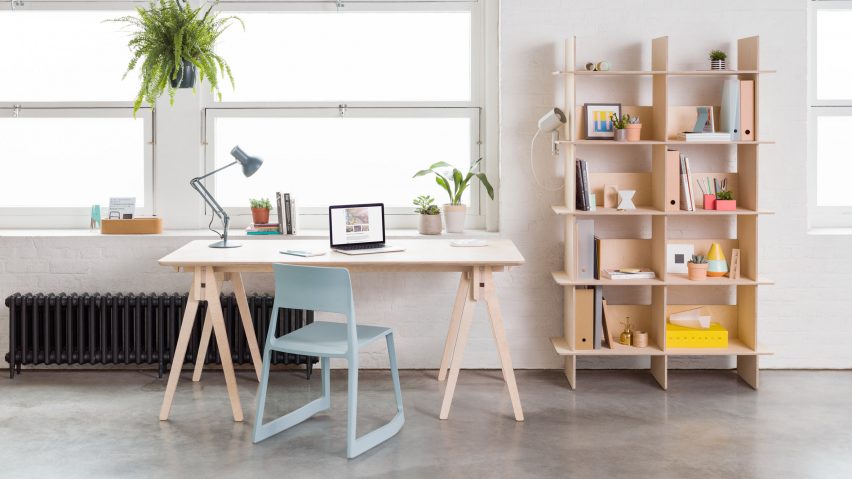Open-source furniture brand Opendesk has collaborated with designers in London and Chicago to create new two pieces of furniture that can be assembled without glue, screws or hinges.
London-based Opendesk – whose business model is based around an online database of designs for digital fabrication – worked with London-based Thor ter Kulve to create a workstation based on Japanese joinery techniques.
It also teamed up with Chicago design duo Pia Narula and Sam Devenport, to create a latticed shelving unit.
Ter Kulve's Bundle Desk is a trestle table that can be easily folded down and put back together, suiting users that change their space regularly. The design reinterprets traditional Japanese joints, to suit digital fabrication.
"I think it's fair to say that Japanese carpenters have mastered joinery," he told Dezeen. "By re-designing the joints for digital fabrication, I could replicate the functional and aesthetic advantages of Japanese joinery without years of experience."
"Designing in this way required a certain mindset – rather than a joint the challenge for me was to create a digital 3D puzzle that would be strong and easy to assemble and disassemble in the physical world."
The designer works from a canal boat in London, and borrowed on his own experience of limited room to create the workstation.
The desk sits on four trestles which overlap each other when positioned end-to-end, to let owners create different furniture combinations without losing space. Its tabletop is made from a single sheet of plywood – chosen to reduce waste.
"Our living environments are more demanding and flexibility is more important than ever," added Ter Kulve, who is originally from Amsterdam, but moved to London to study product design at the Royal College of Art.
"This need for flexibility is something I experienced firsthand, wit my unusual living and work space unfit for most furniture," he said. "This was the starting point – a trestle that anyone can take anywhere."
The Linnea bookcase by Pia Narula and Sam Devenport can similarly be assembled without tools.
The bookcase has a crosshatch shape. This was chosen to be "strong, functional and visually simple", but another benefit is that doesn't require any fittings.
The furniture can be used by itself, or placed alongside more modules to form dividers, perfectly suited to open-plan offices.
"We wanted to build a strong, functional, and visually simple shelving unit that could also be put together and taken apart with ease, and without the need for any hardware," said Narula.
Narula and Devenport run their own furniture brand 57st Design. They collaborated with Opendesk remotely, with both teams producing prototypes.
"We've never met the Opendesk team face-to-face – we're in Chicago, they are in London," revealed Narula. "Instead, we've shared digital files back and forth, prototyped in both cities and developed the design with local making in mind."
Pia Narula explains the design for the Linnea bookcase in this movie
Opendesk describes itself as a "global platform for local making". It connects designers with makers to produce objects on demand, and also offers users the opportunity to download, make and buy furniture for their workspaces.
The company was among the first to 'hack' Tom Dixon's modular bed for Ikea, and also runs a "desks on demand" service for London's workplaces.
"A more open approach to design allows endless collaboration and distributed design development," added Ter Kulve.
"Sharing designs in this way allows objects to live in ways they couldn't in conventional design. They constantly change, grow and improve through the work of many rather than the work of one."

